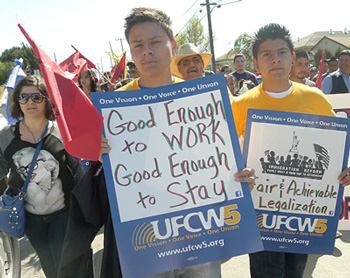

Vol. 77/No. 14 April 15, 2013
 |
| Militant/Eric Simpson |
| March 24 protest in Salinas, Calif., demanding legalization of undocumented immigrants was organized by United Farm Workers and backed by Teamsters, UFCW and other unions. |
The actions take place as Congress is embroiled in debates on “immigration reform” proposals, which many see as an opportunity to press for more rights and legalization for millions of undocumented than the Republican and Democratic politicians have in mind.
The United Farm Workers is one of dozens of unions, immigrant rights groups, and civil rights organizations that have endorsed the April 10 march in Washington, D.C., to demand citizenship for undocumented workers. Demonstrations will take place in other cities that day and the weekend before.
In New York, Chicago and other cities, there will also be demonstrations for legalizing immigrants on May 1.
“Many people live and work here who don’t have papers,” Eloy Magaña Gomez, one of the marchers, told the Militant. “We’re all human beings. They work here. They need to be here.”
In February, Magaña Gomez and 53 other farmworkers won a fight to recertify the UFW at RBI Packing, a lemon orchard in Blythe. Sun World, the previous owner had a contract with the UFW but sold the company to RBI, he said. “We won the recertification of the union 100 percent.”
“With the union we are comfortable. We have medical insurance, a pension, the boss offers you water and gives you bathroom breaks. The boss can’t yell at you, he has to treat you with respect,” Magaña Gomez said.
Magaña Gomez was part of the fight to organize the strawberry pickers in Salinas and Watsonville in 1994 and 1995. “We didn’t win but the struggle was important because of what we got out of it and it helped later on.”
“At one time Coachella was one of the areas where the UFW had a number of contracts. Now we have one in Blythe and one in Coachella. We’re trying to organize here again,” Hilario Torres, a UFW organizer, told the Militant.
The Coachella Valley was the scene of big battles to organize the farmworkers’ union in the mid-1970s.
“We’re at a really critical time,” UFW President Arturo Rodriguez told the rally. “We have to talk to our family members about immigration reform.”
The next day about 300 joined the march in Oxnard and some 2,000, mostly field workers and their families, in Salinas. The Salinas march included contingents from Teamsters Local 890, the United Food and Commercial Workers, and the Service Employees International Union.
“Without legal status, farmworkers can’t collect unemployment during a winter layoff,” field worker Oswaldo Cisneros, who was part of the Salinas march, told the Militant. “Without unemployment insurance workers need to save up all year or find another job, which is becoming harder. We need immigration reform that allows workers to work in the United States for many years.”
‘Long, hard’ road to citizenship
Democratic and Republican party senators say they are close to introducing a bipartisan immigration bill in Congress. According to the March 30 Washington Post, the bill will “feature a 13-year path to citizenship,” more visas for “highly skilled tech workers,” and increased “border control and workplace security” through expansion of programs like the government’s E-verify database system that make it harder for immigrants without papers to work.Undocumented immigrants “will have a path to citizenship,” Republican Sen. Lindsey Graham told CNN. “But it will be earned, it will be long, it will be hard.”
Leaders of the U.S. Chamber of Commerce and the AFL-CIO trade union federation have reportedly reached an agreement on an expanded “guest worker” program that would give temporary work visas to up to 200,000 foreign-born workers a year. The new “W” visa program — for some construction, restaurant and hotel workers — would start with 20,000 visas in 2015. This would be in addition to the already existing H-2A program for farmworkers.
More than 65,000 immigrants received H-2A visas last year. Guest worker programs have been widely criticized, the New York Times notes, because workers “are shackled to employers and thus acutely vulnerable to exploitation.” H-2A visas are granted for a specific boss and workers are subject to immediate deportation if they quit or are fired.
Few details have been released on the proposed “W” program. While the Times and other papers report that workers would be allowed to change jobs, it’s not clear what their status would be between jobs.
At the same time, associations of capitalist farmers are pushing to “reduce the wages currently paid H-2A workers and put in place a wage for new agricultural visa holders lower than what current farmworkers make,” UFW Communications Director Maria Machuca told the Militant. “It would be a grievous mistake to allow agribusiness to use the debate over immigration reform to further reduce wages of the poorest workers in the country.”
Ellie García is the Socialist Workers Party candidate for School Board District 2 in Los Angeles. Eric Simpson contributed to this article from Salinas.
Related articles:
Wash. farmworkers march for immigrant rights
Join actions for immigrant rights!
Front page (for this issue) | Home | Text-version home